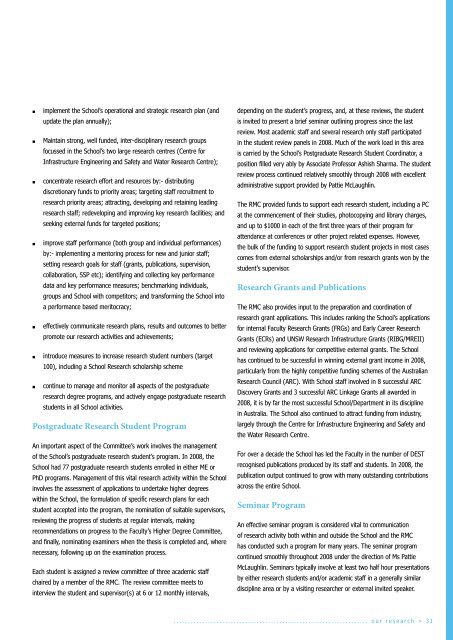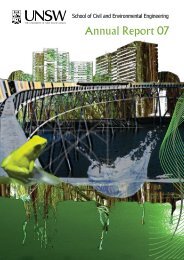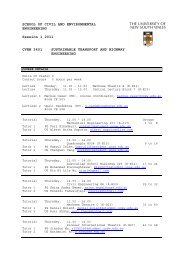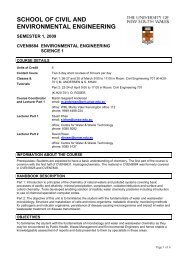Annual Report 08 - School of Civil and Environmental Engineering ...
Annual Report 08 - School of Civil and Environmental Engineering ...
Annual Report 08 - School of Civil and Environmental Engineering ...
You also want an ePaper? Increase the reach of your titles
YUMPU automatically turns print PDFs into web optimized ePapers that Google loves.
m implement the <strong>School</strong>’s operational <strong>and</strong> strategic research plan (<strong>and</strong><br />
update the plan annually);<br />
m Maintain strong, well funded, inter-disciplinary research groups<br />
focussed in the <strong>School</strong>’s two large research centres (Centre for<br />
Infrastructure <strong>Engineering</strong> <strong>and</strong> Safety <strong>and</strong> Water Research Centre);<br />
m concentrate research effort <strong>and</strong> resources by:- distributing<br />
discretionary funds to priority areas; targeting staff recruitment to<br />
research priority areas; attracting, developing <strong>and</strong> retaining leading<br />
research staff; redeveloping <strong>and</strong> improving key research facilities; <strong>and</strong><br />
seeking external funds for targeted positions;<br />
m improve staff performance (both group <strong>and</strong> individual performances)<br />
by:- implementing a mentoring process for new <strong>and</strong> junior staff;<br />
setting research goals for staff (grants, publications, supervision,<br />
collaboration, SSP etc); identifying <strong>and</strong> collecting key performance<br />
data <strong>and</strong> key performance measures; benchmarking individuals,<br />
groups <strong>and</strong> <strong>School</strong> with competitors; <strong>and</strong> transforming the <strong>School</strong> into<br />
a performance based meritocracy;<br />
m effectively communicate research plans, results <strong>and</strong> outcomes to better<br />
promote our research activities <strong>and</strong> achievements;<br />
m introduce measures to increase research student numbers (target<br />
100), including a <strong>School</strong> Research scholarship scheme<br />
m continue to manage <strong>and</strong> monitor all aspects <strong>of</strong> the postgraduate<br />
research degree programs, <strong>and</strong> actively engage postgraduate research<br />
students in all <strong>School</strong> activities.<br />
Postgraduate Research Student Program<br />
An important aspect <strong>of</strong> the Committee’s work involves the management<br />
<strong>of</strong> the <strong>School</strong>’s postgraduate research student’s program. In 20<strong>08</strong>, the<br />
<strong>School</strong> had 77 postgraduate research students enrolled in either ME or<br />
PhD programs. Management <strong>of</strong> this vital research activity within the <strong>School</strong><br />
involves the assessment <strong>of</strong> applications to undertake higher degrees<br />
within the <strong>School</strong>, the formulation <strong>of</strong> specific research plans for each<br />
student accepted into the program, the nomination <strong>of</strong> suitable supervisors,<br />
reviewing the progress <strong>of</strong> students at regular intervals, making<br />
recommendations on progress to the Faculty’s Higher Degree Committee,<br />
<strong>and</strong> finally, nominating examiners when the thesis is completed <strong>and</strong>, where<br />
necessary, following up on the examination process.<br />
Each student is assigned a review committee <strong>of</strong> three academic staff<br />
chaired by a member <strong>of</strong> the RMC. The review committee meets to<br />
interview the student <strong>and</strong> supervisor(s) at 6 or 12 monthly intervals,<br />
depending on the student’s progress, <strong>and</strong>, at these reviews, the student<br />
is invited to present a brief seminar outlining progress since the last<br />
review. Most academic staff <strong>and</strong> several research only staff participated<br />
in the student review panels in 20<strong>08</strong>. Much <strong>of</strong> the work load in this area<br />
is carried by the <strong>School</strong>’s Postgraduate Research Student Coordinator, a<br />
position filled very ably by Associate Pr<strong>of</strong>essor Ashish Sharma. The student<br />
review process continued relatively smoothly through 20<strong>08</strong> with excellent<br />
administrative support provided by Pattie McLaughlin.<br />
The RMC provided funds to support each research student, including a PC<br />
at the commencement <strong>of</strong> their studies, photocopying <strong>and</strong> library charges,<br />
<strong>and</strong> up to $1000 in each <strong>of</strong> the first three years <strong>of</strong> their program for<br />
attendance at conferences or other project related expenses. However,<br />
the bulk <strong>of</strong> the funding to support research student projects in most cases<br />
comes from external scholarships <strong>and</strong>/or from research grants won by the<br />
student’s supervisor.<br />
Research Grants <strong>and</strong> Publications<br />
The RMC also provides input to the preparation <strong>and</strong> coordination <strong>of</strong><br />
research grant applications. This includes ranking the <strong>School</strong>’s applications<br />
for internal Faculty Research Grants (FRGs) <strong>and</strong> Early Career Research<br />
Grants (ECRs) <strong>and</strong> UNSW Research Infrastructure Grants (RIBG/MREII)<br />
<strong>and</strong> reviewing applications for competitive external grants. The <strong>School</strong><br />
has continued to be successful in winning external grant income in 20<strong>08</strong>,<br />
particularly from the highly competitive funding schemes <strong>of</strong> the Australian<br />
Research Council (ARC). With <strong>School</strong> staff involved in 8 successful ARC<br />
Discovery Grants <strong>and</strong> 3 successful ARC Linkage Grants all awarded in<br />
20<strong>08</strong>, it is by far the most successful <strong>School</strong>/Department in its discipline<br />
in Australia. The <strong>School</strong> also continued to attract funding from industry,<br />
largely through the Centre for Infrastructure <strong>Engineering</strong> <strong>and</strong> Safety <strong>and</strong><br />
the Water Research Centre.<br />
For over a decade the <strong>School</strong> has led the Faculty in the number <strong>of</strong> DEST<br />
recognised publications produced by its staff <strong>and</strong> students. In 20<strong>08</strong>, the<br />
publication output continued to grow with many outst<strong>and</strong>ing contributions<br />
across the entire <strong>School</strong>.<br />
Seminar Program<br />
An effective seminar program is considered vital to communication<br />
<strong>of</strong> research activity both within <strong>and</strong> outside the <strong>School</strong> <strong>and</strong> the RMC<br />
has conducted such a program for many years. The seminar program<br />
continued smoothly throughout 20<strong>08</strong> under the direction <strong>of</strong> Ms Pattie<br />
McLaughlin. Seminars typically involve at least two half hour presentations<br />
by either research students <strong>and</strong>/or academic staff in a generally similar<br />
discipline area or by a visiting researcher or external invited speaker.<br />
. . . . . . . . . . . . . . . . . . . . . . . . . . . . . . . . . . . . . . . . . . . . . . . . . . . . . . . . . . . . . . . . . . . . o u r r e s e a r c h > 3 1








